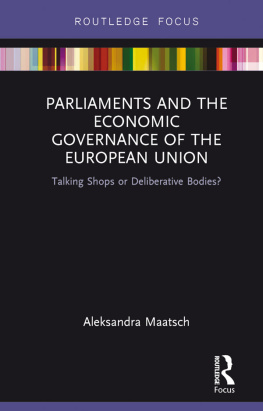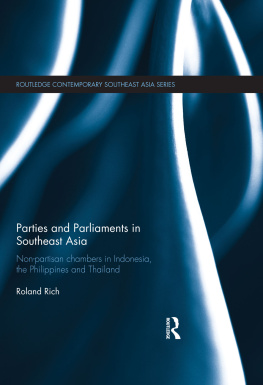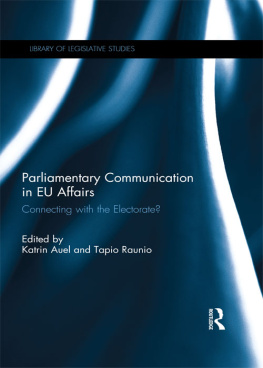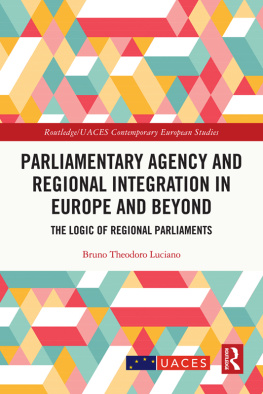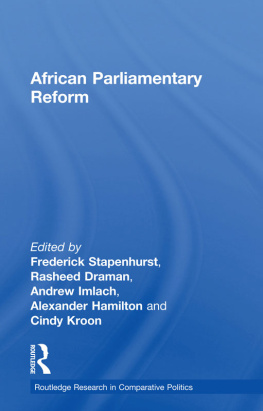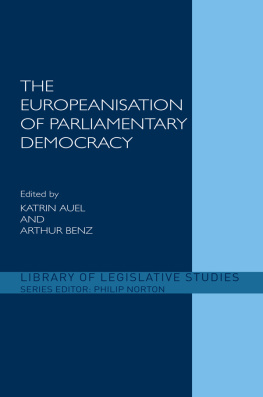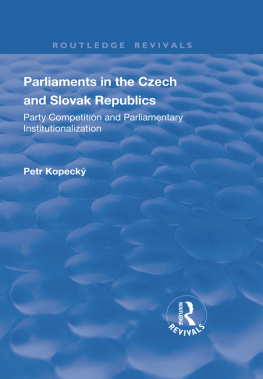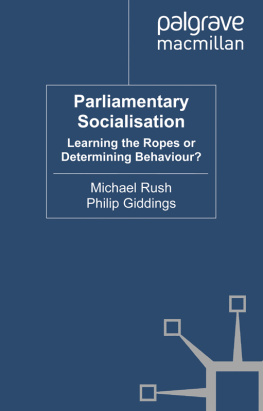Parliaments and the Economic Governance of the European Union
This book analyzes how national parliaments and parliamentary parties performed their legislative, representative and control functions during the reform of European economic governance. Focussing on domestic approvals of anti-crisis measures (EFSF, ESM and the Fiscal Compact) in all member states of the eurozone, the book aims at establishing to what extent national parliaments and parliamentary parties secured their competences in EU policy-making during that process.
This book employs an interdisciplinary approach and analyzes (1) in which states parliaments formal powers in approval of anti-crisis measures were constrained, (2) how parliamentary parties voted on the analyzed measures, (3) what were the dominant discourses of their proponents and opponents and (4) which parties advocated neoliberal and which Keynesian measures.
This text will be of key interest to scholars, students and practitioners in European Union politics and studies, political parties and parliaments, European Economic governance and more broadly to European politics.
Aleksandra Maatsch is Chair of European and Multilevel Politics (Interim), University of Cologne, Germany.
Routledge Studies on Government and the European Union
Edited by Andy Smith, University of Bordeaux, France
1The European Council and European Governance
The commanding heights of the EU
Edited by Franois Foret and Yann-Sven Rittelmeyer
2The EUs Government of Industries
Markets, institutions and politics
Edited by Andy Smith and Bernard Jullien
3Policy change in the Area of Freedom, Security and Justice
How EU institutions matter
Edited by Florian Trauner and Ariadna Ripoll Servent
4The Mechanisms of Institutional Conflict in the European Union
Ludvig Norman
5Public Ethics at the European Commission
Politics, reform and individual views
Andreea Nstase
6Parliaments and the Economic Governance of the European Union
Talking shops or deliberative bodies?
Aleksandra Maatsch
7EU Presidencies between Politics and Administration
The governmentality of the Polish, Danish and Cypriot Trio Presidency in 20112012
Mads Dagnis Jensen and Peter Nedergaard
Parliaments and the Economic Governance of the European Union
Talking Shops or Deliberative Bodies?
Aleksandra Maatsch
First published 2017
by Routledge
2 Park Square, Milton Park, Abingdon, Oxon OX14 4RN
and by Routledge
711 Third Avenue, New York, NY 10017
Routledge is an imprint of the Taylor & Francis Group, an informa business
2017 Aleksandra Maatsch
The right of Aleksandra Maatsch to be identified as author of this work has been asserted by her in accordance with sections 77 and 78 of the Copyright, Designs and Patents Act 1988.
All rights reserved. No part of this book may be reprinted or reproduced or utilized in any form or by any electronic, mechanical, or other means, now known or hereafter invented, including photocopying and recording, or in any information storage or retrieval system, without permission in writing from the publishers.
Trademark notice: Product or corporate names may be trademarks or registered trademarks, and are used only for identification and explanation without intent to infringe.
British Library Cataloguing in Publication Data
A catalogue record for this book is available from the British Library
Library of Congress Cataloging-in-Publication Data
Names: Maatsch, Aleksandra, 1979 author.
Title: Parliaments and the economic governance of the European Union : talking shops or deliberative bodies? / Aleksandra Maatsch.
Description: New York : Routledge, 2017. | Series: Routledge studies on government and the European Union | Includes bibliographical references and index.
Identifiers: LCCN 2016029226 | ISBN 9781138230033 (hardback) | ISBN 9781315387260 (ebook)
Subjects: LCSH: European Union countriesSocial conditions21st century. | Central-local government relationsEuropean Union countries. | Decentralization in governmentLaw and legislationEuropean Union countries. | European Union countriesEconomic policy.
Classification: LCC HN373.5 .M33 2017 | DDC 306.0947dc23
LC record available at https://lccn.loc.gov/2016029226
ISBN: 978-1-138-23003-3 (hbk)
ISBN: 978-1-315-38726-0 (ebk)
Typeset in Times New Roman
by Apex CoVantage, LLC
Contents
The idea to pursue a book project dealing with the role of national parliaments and parliamentary parties in the reform of European economic governance was born in Madrid in late 2011. During that period I worked as a postdoctoral researcher in the Institute for Public Goods and Policies at the Spanish National Research Council (CSIC). The initial phase of my work consisted of developing the research design and finding proper methodological tools to analyze the diverse datasets, and I profited here enormously from the interdisciplinary composition of Carlos Closas research group of which I was a member. As a result, this book combines legal analysis of various formal approval procedures of anti-crisis measures with comparative analysis of parliamentary parties voting behaviour and plenary debates analysis. The books methodology combines statistical analysis of vote outcomes with the Qualitative Comparative Analysis (QCA) of parties macroeconomic preferences as well as comparative discourse analysis. The application of this interdisciplinary multi-method approach would not have been possible without the stimulating discussions I had, usually over media maana, with Cristina Daniela Vintila, Patricio Galella, Pablo Castillo Ortz and Maria Cecilia Gemes. Thanks to the legal expertise and linguistic support of Patricio Galella, but also Athena Charalamboglou, I was able to incorporate all member states of the eurozone into the empirical analysis. Finally, I would like to express my special gratitude to Carlos Closa for his support and engagement going far beyond this book project.
From autumn 2013, I continued working on the book at the University of Cambridges Department of Politics and International Studies. The Cambridge-based OPAL (Observatory of Parliaments after the Lisbon Treaty) project team, directed by Julie Smith, was composed of Geoffrey Edwards, Ian Cooper, Ariella Huff and Anna Dzieszkowska. Our cooperation within the OPAL project has had a very stimulating effect on my work on the book project.
The book was finalized in 2015 at the Max Planck Institute for the Study of Societies in Cologne. The research-oriented and very friendly atmosphere at the Institute created a unique environment facilitating work-efficiency. I am particularly indebted to Martin Hpner for his very insightful comments and suggestions on selected parts of the book. I would also like to thank the editorial unit at the Institute for their very thorough work.
Most chapters of this book have been presented during various conferences and workshops, predominantly within the framework of the OPAL project and the PADEMIA network (Parliamentary Democracy in Europe). I would like to thank each and every colleague affiliated with the two projects for commenting and discussing my work.
Cologne, August 2015

